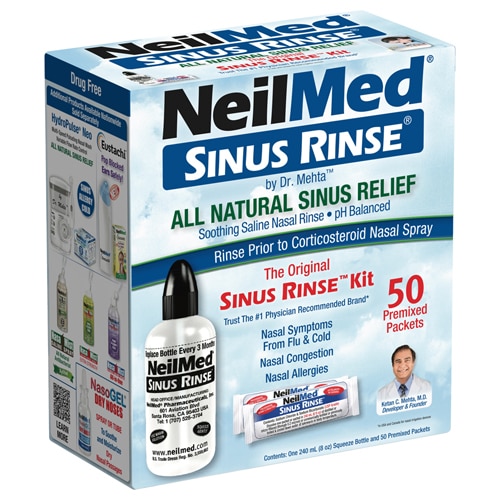[vc_row][vc_column][vc_column_text]When warm springtime weather brings green grass and colorful flowers, it can also bring
allergies. As pollen counts climb, you might experience itchy, watery eyes; a runny nose; or sneezing. Don’t blame the pollen for these reactions, though; they’re all the result of histamine.
But what exactly
is histamine? What does it do? How does it cause
allergy symptoms, and what’s the best way to minimize its effects?

What is histamine?
Histamine is a chemical derivative of ammonia called an amine that forms when your body breaks down the amino acid histidine. It’s found just about everywhere: in plants, animals, insect venom and (of course) people.
In your body, histamine hangs out in two types of white blood cells: basophils and mast cells, which mediate inflammatory and allergic responses. But histamine doesn’t just wait around for its chance to make you miserable during allergy season. It has a wide range of functions that affect several body systems.
Histamine functions
Cells throughout your body have histamine receptors, which can be one of four types. Labeled H1 through H4, each receptor is associated with a
different histamine function or biological response.
In an allergic reaction, H1 receptors are activated and set off a chain of events. Here’s what happens when springtime pollen levels rise:
- Pollen comes in contact with your eyes, nose or skin
- Your immune system recognizes the pollen as a foreign invader—an antigen—and tags it with antibodies
- Mast cells release large amount of histamine in response
- Histamine increases capillary permeability, causing fluid to leak out into the surrounding tissues
- You get watery eyes, a runny nose or other allergy symptoms
But histamine doesn’t always cause unpleasant reactions. It has several important and helpful functions, including:
- Smooth muscle contractions in organs like the lungs, stomach and uterus
- Blood vessel dilation
- Increased blood vessel permeability
- Communication between the hypothalamus, the spinal cord and nerves throughout the body
- Alertness and sleep/wake cycle regulation
- Inflammatory responses in injury and illness
Histamine is also found in your digestive system, where it may play a sort of Jekyll and Hyde role depending on where and how it’s released.
Histamine and the gut
During digestion, histamine prompts the parietal cells in your stomach to secrete gastric acid. Once the stomach environment reaches the right pH, histamine release stops. This process is essential for proper digestion, which makes histamine the hero in this case.
Further down in the gut, though, there are bacteria with the ability to release histamine of their own. Although not a lot is known about these bacteria, people with IBS and IBD have
higher levels of them in their guts than healthy people. People with IBS also appear to have
more mast cells and higher histamine levels overall. This can result in increased symptom frequency and severity when mast cells
release large quantities of histamine near nerves in the colon.
Larger numbers of mast cells and higher histamine levels are also present in the guts of people with food allergies. However, there haven’t been enough studies done to determine whether antihistamine treatments may be an appropriate way to address food allergies or IBS symptoms.
How to control histamine reactions
What does all this mean for allergy season, when histamine has you sneezing and blowing your way through boxes of tissues?
The most obvious solution is to avoid allergens that prompt histamine release. But since that can be almost impossible when the pollen count is high, your best bet is to arm yourself with something that blocks histamine’s action: antihistamines.
Over-the counter antihistamines
Over-the-counter medications for allergies control symptoms by blocking H1 receptors. Some, known as first-generation antihistamines, are able to cross the blood-brain barrier to work on receptors in the central nervous system. This can interfere with alertness and
make you feel drowsy.
Newer second- and third-generation antihistamines are considered safer because they don’t cross the blood-brain barrier in significant amounts and don’t have the potential to interact with as many other medications. However, both types of antihistamines may cause
side effects, including:
- Headache
- Cough
- Tiredness
- Dry mouth or eyes
- Dizziness
- Sore throat
- Abdominal discomfort
- Nausea
If your allergies are severe, the benefits of over-the-counter antihistamines may outweigh the risk of these potential effects.
Natural ways to support healthy histamine response†
Some vitamins and dietary supplements can act as natural histamine blockers.
† If you prefer to stick with natural remedies for your allergies, you can try supplementing with:
- Vitamin C with bioflavonoids
- Bromelain, an enzyme found in pineapple
- Quercetin, a compound found in apples, green tea, berries, broccoli and other foods
- Stinging nettle
- Butterbur
Using a
nasal saline rinse once or twice per day may also help reduce allergy symptoms. It doesn’t block histamine, but it can ease congestion and calm inflammation in your nasal passages.
If antihistamines don’t help with your allergy symptoms or your allergies are severe enough to interfere with daily life, it’s best to talk with your doctor. He or she may be able to prescribe a stronger antihistamine or do other tests to determine the underlying cause of your reactions.
Remember that histamine is at work every day whether you’re experiencing allergy symptoms or not. Seasonal allergies are just the result of one of this compound’s many functions, all of which are important for an overall healthy body.
†These statements have not been approved by the Food and Drug Administration. These products are not intended to diagnose, treat, cure or prevent disease.[/vc_column_text][/vc_column][/vc_row][vc_row][vc_column][vc_text_separator title="Featured Products" border_width="2"][vc_row_inner equal_height="yes" content_placement="middle" gap="35"][vc_column_inner width="1/3"][vc_single_image image="159330" img_size="full" alignment="center" onclick="custom_link" img_link_target="_blank" css=".vc_custom_1650321544533{padding-right: 7% !important;padding-left: 7% !important;}" link="https://www.vitacost.com/bioallers-outdoor-allergy-treatment"][/vc_column_inner][vc_column_inner width="1/3"][vc_single_image image="159331" img_size="full" alignment="center" onclick="custom_link" img_link_target="_blank" css=".vc_custom_1650321562874{padding-right: 7% !important;padding-left: 7% !important;}" link="https://www.vitacost.com/natures-way-umcka-allergy-sinus"][/vc_column_inner][vc_column_inner width="1/3"][vc_single_image image="159332" img_size="full" alignment="center" onclick="custom_link" img_link_target="_blank" css=".vc_custom_1650321581960{padding-right: 7% !important;padding-left: 7% !important;}" link="https://www.vitacost.com/neilmed-original-sinus-rinse-kit-1-kit"][/vc_column_inner][/vc_row_inner][/vc_column][/vc_row]




